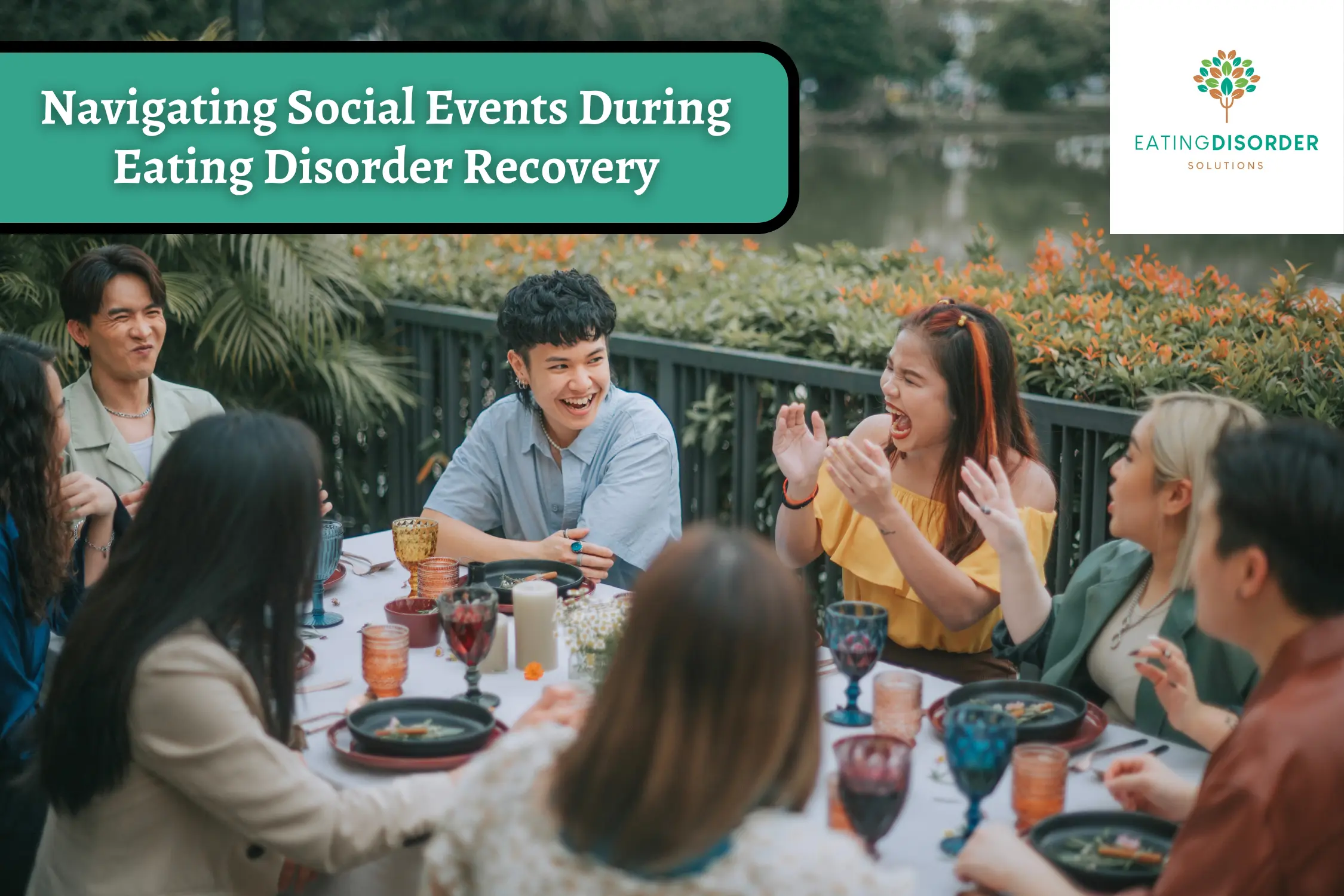Handling social events while recovering from an eating disorder can be tough due to potential triggers like food-centered environments, societal pressures related to appearance, and discussions focusing on dieting or body image. These triggers stir strong emotions and can slow down healing progress, especially when combined with the pressure to fit into societal eating standards, which can heighten anxiety and self-doubt.
To navigate these situations well, it’s important to prepare thoughtfully, build emotional resilience, and use effective coping strategies. Keeping your recovery goals in mind during social gatherings is key – it reinforces your progress and protects your emotional well-being. Strategies like setting boundaries, practicing mindfulness, and seeking support help to build resilience and empower you to engage in social interactions with sensitivity and self-care. This approach supports ongoing healing and personal growth in a relaxed and sustainable way.
Understanding Triggers in Social Settings
Triggers in the context of eating disorders are things or situations that can stir up disordered eating behaviors, thoughts, or emotions. These triggers can be different for everyone, such as specific foods or places that make you feel anxious or guilty, comments about appearance that affect how you see yourself, feelings like stress or loneliness that lead to using food to cope, social situations where eating or how you look might make you feel uneasy, and places that remind you of past struggles with food. Recognizing these triggers is important in recovery because it helps you figure out ways to handle them and work towards feeling better about food, your body, and yourself overall.
Interested in learning more about relapse triggers? Click here.
Social events can bring up specific challenges for individuals with eating disorders, affecting their relationship with food and body image in various ways:
- Food-focused gatherings: Events centered around food, such as parties, dinners, or celebrations, can be triggering due to the abundance and variety of food options. Buffet-style setups or meals where eating is a central activity may evoke anxiety about making food choices, fear of overeating or being judged for eating habits. You may feel pressured to conform to societal expectations or compare your eating behaviors with others present.
- Body image discussions: Conversations revolving around body image, weight, diets, or appearance can significantly impact individuals with eating disorders. Discussions about weight loss strategies, diet plans, or comparisons related to physical appearance may trigger feelings of inadequacy, self-consciousness, or guilt. Such discussions often perpetuate unrealistic beauty standards and reinforce negative self-perceptions, making individuals more vulnerable to harmful thoughts or behaviors related to food and body image. If you think you may have body dysmorphia, take our body dysmorphia quiz.
- Social pressure and expectations: Social events can create pressure to participate in eating rituals or conform to cultural norms around food consumption. Comments or compliments related to appearance, weight loss, or physical fitness can inadvertently trigger feelings of shame or anxiety, especially for those sensitive to external validation or criticism.
- Environmental cues: The physical environment of social events, such as the layout of food displays, availability of alcohol, or seating arrangements, can serve as triggers. Certain settings or locations may remind you of past negative experiences or behaviors associated with your eating disorder, potentially intensifying emotional responses and challenges in maintaining recovery goals.
Knowing these triggers is crucial for your journey toward recovery from an eating disorder. It empowers you to create effective strategies to navigate challenges and foster healing. By identifying the situations or emotions that provoke disordered eating behaviors and negative feelings, you can better prepare yourself mentally and emotionally for similar circumstances, especially during social events.
Preparing Mentally and Emotionally
Preparing yourself mentally for social events while recovering from an eating disorder involves taking a holistic approach. This means focusing on managing triggers and creating a positive experience that supports your ongoing journey to healing.
How to prepare:
- Understanding Triggers: Start by identifying the specific things that might trigger you in social settings. These could range from environments heavily focused on food choices to discussions about diets or body image, and even societal pressures to eat a certain way. Recognizing these triggers gives you the power to anticipate challenges and prepare strategies to handle them proactively.
- Setting Intentions: Before heading to any event, clarify your intentions. Whether you’re there to socialize, celebrate, or simply enjoy company, setting positive intentions shifts your focus away from worries about food and appearance. It helps you approach the gathering with a mindset centered on personal growth and well-being.
- Practicing Mindfulness: Incorporate mindfulness techniques to stay present and grounded. Deep breathing, mindful meditation, or body scans can ease pre-event jitters and manage any anxiety or emotional triggers that may arise during the event. Mindfulness heightens awareness of your thoughts and feelings, enabling thoughtful responses instead of impulsive reactions to triggering situations.
Learn more about our approach to mindfulness techniques and psychotherapy.
- Visualizing Success: Take a moment to visualize yourself navigating the event successfully. Picture yourself engaging comfortably in conversations, making food choices aligned with your recovery goals, and handling any triggers with resilience and self-compassion. Visualization prepares your mind for positive outcomes, boosting confidence in your ability to stay in control and prioritize your well-being.
- Preparing Food and Snacks: Plan ahead by considering the food options available at the event. If necessary, eat a balanced meal beforehand to avoid feeling excessively hungry or tempted to overeat. Bringing along a small snack or meal that you’re comfortable with can provide a sense of security, enabling you to participate in social activities without pressure or guilt over food choices.
- Setting Boundaries: Establish clear boundaries around conversations and behaviors that could affect your emotional well-being. Politely redirect discussions away from diets or weight loss, steer them towards more positive topics, or gracefully excuse yourself from situations that feel overwhelming or triggering. Setting these boundaries empowers you to prioritize your recovery and maintain a supportive environment for yourself.
- Seeking Support: Identify supportive friends, family, or peers who understand your journey and can offer encouragement during the event. Having a trusted ally to lean on provides perspective, emotional support, and practical guidance when navigating challenging social dynamics or unexpected triggers.
By incorporating these strategies into your pre-event routine, you equip yourself to enter social gatherings with resilience, self-awareness, and a commitment to nurturing positive experiences that advance your ongoing journey of healing and recovery from an eating disorder.
Practical Coping Strategies During Social Events
Navigating social events while managing an eating disorder presents a unique set of challenges, from maneuvering food-centric gatherings to handling body image discussions. However, with thoughtful preparation and practical coping strategies, these events can become opportunities for growth and connection rather than sources of stress.
Imagine stepping into a bustling party or dinner with a plan in hand—setting boundaries around food choices that support your well-being, bringing along a supportive friend who understands your journey, and practicing mindfulness techniques to stay grounded amidst social pressures. These strategies not only empower you to confidently manage triggers but also allow you to focus on enjoying meaningful conversations and moments of connection.
By approaching social events with courage and self-compassion, you can navigate these occasions with greater ease while continuing to prioritize your recovery journey.
- Practice Mindfulness: Use mindfulness techniques, such as deep breathing or grounding exercises, to stay present and manage anxiety or negative thoughts that may arise. Dive deeper into practicing distress tolerance skills.
- Engage in Distractions: Engage in conversations or activities that are unrelated to food or body image. This can help shift focus away from triggering topics.
- Seek Out Safe Spaces: Identify quiet areas or safe spaces where you can retreat if you need a break from social interactions or overwhelming stimuli.
- Use Affirmations: Repeat positive affirmations or reminders of your recovery goals to reinforce your commitment to self-care and healing.
- Focus on Socializing: Emphasize connecting with others and enjoying the company rather than solely focusing on food-related aspects of the event.
- Practice Self-Compassion: Be kind to yourself throughout the event. Acknowledge any challenges you face and celebrate your efforts in managing them.
- Reflect and Learn: After the event, take time to reflect on what went well and any areas where you may want to improve your coping strategies for future gatherings.
Armed with these practical coping strategies, you’ll confidently navigate social events, creating a supportive atmosphere that enriches your path to recovery. Each strategy fortifies a positive mindset and fosters a more serene connection with food and body image in social settings. This holistic approach not only enhances your enjoyment of gatherings but also reinforces your journey towards lasting healing and well-being.
Embracing Flexibility and Self-Compassion
Adapting with flexibility to unexpected challenges during social events is not only essential for successfully navigating the complexities of social interactions but also crucial for creating a relaxed and positive atmosphere where you can feel comfortable and engaged.
Picture yourself at a gathering where things don’t go exactly as planned—maybe the food options change suddenly or a conversation takes an unexpected turn toward sensitive topics like diets. Being flexible means adapting calmly and creatively, whether it’s opting for different food choices that support your recovery journey or steering conversations towards more comfortable subjects.
Learn how to accept change more easily.
Embracing flexibility allows you to stay present and responsive, cultivating a sense of ease rather than feeling overwhelmed by the unexpected. It’s about finding practical solutions in the moment and focusing on the connections and happiness that social events can offer. By cultivating this mindset, you can navigate gatherings with confidence and a welcoming attitude toward whatever unfolds.
When facing social events with an eating disorder, prioritizing self-compassion and celebrating small wins is key. But what does practicing compassion look like?
- Acknowledge Your Humanity: Recognize that everyone makes mistakes, faces challenges, and experiences setbacks. It’s a natural part of being human.
- Be Kind to Yourself: Use gentle and supportive language when talking to yourself. Avoid self-criticism and instead offer words of encouragement and understanding.
- Validate Your Emotions: Allow yourself to feel what you’re feeling without pushing it away or suppressing it. Validate your emotions as a normal response to your experiences.
- Challenge Negative Thoughts: Notice when you’re being self-critical or judgmental. Challenge these negative thoughts by asking yourself if they’re based on facts or distorted perceptions. Learn more about how to challenge your eating disorder voice.
- Celebrate Your Strengths: Recognize your strengths, accomplishments, and positive qualities. Celebrate small victories and milestones along your journey.
It’s about acknowledging the bravery it takes to attend and engage, and being kind to yourself throughout the process. Whether it’s making a positive food choice, navigating a conversation without stress, or simply showing up, each small victory deserves recognition and a moment of celebration.
Learn Distress Tolerance and Effective Coping Skills With Eating Disorder Solutions
Navigating social events while managing an eating disorder can feel challenging, given the triggers and pressures involved. However, with effective eating disorder solutions, you can turn these situations into opportunities for personal growth and connection.
By embracing flexibility in food choices, practicing self-compassion, and celebrating small victories along the way, you empower yourself to navigate social gatherings confidently on your path to recovery. Together, we can create a supportive environment where each step forward is recognized and celebrated, making your healing journey both rewarding and transformative.
If you or someone you know is struggling with an eating disorder, we encourage you to reach out to us at Eating Disorder Solutions. Our team of experts is dedicated to providing the support, treatment, and care necessary to overcome these challenges. For more information or to schedule a consultation, please call 855-808-4213 visit our contact page. Remember, recovery is possible, and we are here to help every step of the way.



